- Home
- Joy Dettman
Thorn on the Rose Page 8
Thorn on the Rose Read online
Page 8
LAURENCE GEORGE MORGAN
If Vern hadn’t been sulking, Gertrude would have asked him to drive her and the baby to Willama on Saturday morning. She hadn’t seen him since before Christmas. The garage man would drive her down, for a price, but she didn’t like disturbing him at the weekend when it wasn’t an emergency. It could wait until Monday.
Elsie, who wouldn’t hear of giving Margot up to strangers, kept her distance from the new baby — on Gertrude’s instruction. She’d told her it was Jenny’s decision, that she’d promised not to interfere.
The fates interfered. Rain poured down for most of Monday. They delayed the trip again. Jenny had the resilience of a rubber band; by Wednesday, she’d be up to travelling, which would allow them to get the papers signed while they were down there.
‘Will I know who they give her to, Granny?’
‘It’s all done with great secrecy, darlin’. They can’t have the new mother falling in love with her only for you to change your mind and want her back.’
‘I can’t,’ Jenny said.
On Wednesday morning, she put the fear of God into Elsie when she came to the back door, asking to see Margot.
‘I don’t want to fight with you, lovey, but I’m not letting you take her down to give to strangers,’ Elsie said.
‘I just want to look at her, Elsie.’
She looked at Margot that morning, and for the first time. She looked at her for a full fifteen seconds, at her hands first. Margot had the stubby Macdonald hands. She had their pale purplish eyes, was as fat as lard and as pale — and she didn’t like strangers.
‘Tell me what to do, Granny.’
‘I told you that you shouldn’t be running around yet. Do you ever take a scrap of notice of anything I tell you to do?’
‘I do. I can’t . . . I can’t think straight.’
‘I’m not saying a word.’
‘I want you to.’
Gertrude stood watching as Jenny dressed the redhead for travelling, handling the tiny mite as if she’d been doing it for years.
‘All I know, darlin’, is that a wrong decision, made for whatever reason, can’t be undone. Whatever you decide to do today, you have to be very certain you can live with forever.’
‘I can’t live with any decision I ever make. What if the people they give her to don’t look after her? What if they give her to people who don’t like her red hair? Some people don’t.’
Jenny liked it. She liked brushing it. She liked watching that silly little mouth suck its bottles dry.
Sixteen is not far enough removed from the time of the dressing of dolls. She’d stitched frills to one of Margot’s hand-me-down baby gowns, wanting the baby to look well dressed when she gave her away. Now she brushed her hair, tied it back from her brow with a yellow bow.
‘She’s not a doll to play with, darlin’. She’ll be walking in twelve months’ time. When you’re twenty-one, she’ll be at school.’
‘You’re saying you want me to give her away?’
‘I want you to know the consequences of not giving her away. You can’t hide her. Her birth will have to be registered. You’ll need to tell me her father’s name.’
‘He’s gone.’
‘If you write Father unknown in some city office now, that’s what that little girl will carry through her life.’
‘I won’t even know her name. They’ll probably call her Cecelia . . . or Florence.’
‘It will be her new parents’ right to name her. She’ll be given a birth certificate with their names on it.’
‘Will mine be on it?’
‘No.’
‘She shouldn’t have been born with my hands!’
Silly little hands, tiny gripping, clawing things, determined to hang onto what little they had.
‘Her name is Georgie,’ she said. ‘He was Laurie.’
‘Laurie who?’
‘Laurence George Morgan, if you must know,’ Jenny said, expecting Gertrude to recognise the name.
She didn’t. She didn’t send word in to the garage man either. She watched and she waited, then on Friday while she was preparing to go into town, Jenny asked her if she’d be angry if she said she didn’t want to give her away.
‘I’d be proud of you,’ Gertrude said. ‘But she’ll be your responsibility.’
‘I know.’
Sometimes there are no options. Sometimes you have to weigh up the good and the bad and find a balance you can live with.
There’d been no good and bad to balance the night she’d got into the goods van. All along that had been her plan — while they’d talked about weddings, while she’d agreed with everything they’d said, she’d planned her escape. Nothing ever goes exactly to plan.
As a three-year-old she’d known the names of every station between Woody Creek and Melbourne. As a ten-year-old, since she’d watched Sissy opening her first mail order parcel, since she’d smelt the essence of the distant city, she’d known it was a magic place, and that she’d go there one day.
Her first glimpse of Melbourne by night hadn’t disappointed. It was a fairy land, a giant’s star-studded cloak flung over all of the earth. She’d known before the train had pulled into Spencer Street that she’d find Mary Jolly’s house and finally live happily ever after — or Cara Jeanette Paris would live happily ever after. Jenny Morrison wasn’t getting off that train.
No one took a scrap of notice of her at Spencer Street. No one told her she couldn’t spend the night in the ladies’ waiting room. She’d bought a cup of tea and raisin bread toast for breakfast, bought a ticket out to Surrey Hills. Which was when Melbourne had stopped being magic. Mary’s station wasn’t as she’d imagined it to be, nor were the streets around the station.
She’d addressed a hundred envelopes to Mary; she’d known for years that Mary’s street was only two blocks from the station, that she lived at number thirty-three.
Two blocks east? West? North? South?
Jenny couldn’t find Mary’s street. She should have written to her, should have arranged to meet her in the city — or should have paid a taxi to drive her to the address.
She returned to the station, but the stationmaster only worked at Surrey Hills; he didn’t live there. She asked a dozen people. She asked in a ladies’ wear shop where the woman told her to speak to the chap at the post office, that he’d have a map of the area.
The post office was on the far side of the road — a busy road that Saturday morning. She’d been crossing over, watching cars, watching people on bikes, watching drays, wondering if any of them knew where they were going, when a car backed out from the kerb. One second she was waiting for a loaded truck to go by, the next she was flat on her backside, on the road.
People came from everywhere.
‘Stay down, dear,’ they said. ‘Someone get a doctor. Someone call the ambulance.’
Faces circling her, bike riders stopping to stare and the crowd stopping the traffic. Car horns bleating.
She didn’t stay down; she scrambled to her feet. As soon as she put her foot on the ground, she knew her ankle wasn’t going to walk anywhere.
The driver who had knocked her over, a businessman wearing a suit and hat, looked worried. He said he’d drive her to the hospital. She told him she had to go to her friend’s house.
A taxi driver might have found Mary’s address faster, but the businessman found it. She thanked him. He apologised again for knocking her over then drove away up the long street.
A woman with a baby in her arms opened the door of number thirty-three, and she’d never heard of Mary Jolly.
And the businessman hadn’t gone after all. He’d turned his car around and was watching her as she closed the gate.
‘Not home?’ he said.
‘There must be two streets with the same name,’ she said.
‘We’ll try the neighbour.’
It wasn’t the wrong street. The neighbour knew Mary Jolly. She knew her mother had died.
‘J
anuary it was when she passed,’ she said. ‘It was that terrible heat wave that took her, deary. I think the eldest son took Mary in. There’s four brothers. I don’t know which one she went to. She couldn’t have managed here alone of course, not with her leg the way it is. What’s your name, deary, just in case I happen to hear from her?’
‘Cara Paris.’
Rain spitting down, settling like dew on her black coat, on his grey hat, and her ankle starting to swell.
‘Where to now, Cara Paris?’ he said.
‘Nowhere,’ she said, and dared a glance at his face. He was the image of Clark Gable. She looked away fast.
He took her arm and led her back to his car as the spitting rain became a gusty shower. She got in out of the rain. He offered her a cigarette.
She’d smoked with Dora Palmer; she’d smoked with Joey. She smoked with a redheaded Clark Gable that morning while heavy rain thrashed the car windows and condensation settled like fog on the windscreen.
She could barely see the house where Mary Jolly had once lived. It was like looking at a mirage. And that’s all her plan — to stay with Mary — had ever been: a mirage that disappeared as you ran to grasp it.
‘Where do your folk live?’ he asked.
‘They’re dead,’ she said.
‘How old are you, sweetheart?’
‘Nineteen,’ she lied. Cara Jeanette had always been older than Jenny.
‘So, where to now?’ He started the car. He wanted to go.
‘I’ll get a job somewhere.’
‘Not with that foot, you won’t. The hospital?’
‘Is there . . . a cheap boarding house somewhere?’
‘I don’t know the area,’ he said. ‘Are you any good at cleaning?’
‘I don’t care what I do.’
He told her he was staying at a big house that needed a good spit and polish.
‘Could I live in?’ she asked.
‘It’s well out of town, sweetheart,’ he said. ‘Nothing around it for miles.’
‘Yes please,’ she said.
And maybe there was a God who knew that Mary’s mother was dead. Maybe He was watching over her — like Norman thought he was — and he’d sent down a guardian angel, and made him look like Clark Gable, who was her favourite film star.
His house was built on the side of a hill. He led her in through the back door. She thought his wife would be inside, or his mother. No one was there and the house was freezing cold.
‘Keep that foot up until I can get something to bandage it with,’ he said. ‘I’ve got a bit of business to attend to.’
He left her alone in a house nicer than Vern Hooper’s, and she went to sleep on his couch, her feet tucked up beneath Granny’s coat. She didn’t open her eyes until he returned with fish and chips wrapped in newspaper.
No cup of tea, no stove lit to make tea, but he poured her a glass of something red she thought was raspberry cordial, until she took a sip. It tasted like poison, but he drank it so she drank it. He strapped her ankle later, then showed her to a fancy bedroom, offered her a silky pink nightgown — his sister’s, he said.
Her shoe wouldn’t fit on over the bandage. He produced a pair of fluffy slippers, also his sister’s. She wore them for a week, with her ankle-length overcoat, while she cleaned his house, dusted his beautiful things — and felt like Amber, polishing off every flyspeck.
Then, on the Friday, he paid her five pounds!
Irene Palmer had worked as a maid for Vern Hooper; she hadn’t made five pounds in a month.
‘That’s too much,’ she said.
‘As far as I’m seeing it, sweetheart, you’ve got three options. You buy a ticket back to where you came from with that money —’
‘No.’
‘Or I drop you off to the Salvos.’
The Salvation Army people would try to make her go home. She’d shaken her head.
‘They’re good people. They won’t ask you the hard questions.’
He’d said three options. She waited for the third option, and when there was no third option, she asked him if she could keep working for him.
‘Any chance of me getting you out of your nun’s habit?’ he said. He meant her overcoat. Twice before he’d called it her nun’s habit.
‘I could light the kitchen stove,’ she said. ‘There’s plenty of wood.’
‘You’re already lighting more fires than you know. You’re a beautiful thing. Do you know that?’
She should have known what he was after. She didn’t. She should have had the sense to go to the Salvos, but he said the house belonged to his sister, that she’d be coming home soon. And Jenny was scared of Melbourne without Mary. Scared of starting again somewhere else. Scared of everything — except him, her guardian angel. She trusted him.
For three weeks she trusted him and cleaned his house, ate what he brought home.
Then one night he’d come home with two brown paper parcels.
‘Open them up, sweetheart,’ he said. ‘I need to go out and celebrate.’
Parcels from city shops had always been Sissy’s to open. She shouldn’t have opened his parcels, but she did, and that same city essence had sprung out, swamping her with that same old envy of Sissy’s pretty things.
He’d bought her a lime green dress, stockings, and a belt to hold up the stockings. She shouldn’t have tried that dress on. She did. She put the stockings on, worked out how to keep them up.
It was like being in a film that night, like acting in a movie with Clark Gable, his hair dyed red for the role, like being Cara Jeanette. All she had to do in that movie was wear a modern dress and sit at a restaurant table smoking his cigarettes while waiters in fancy black suits called her madam and filled her glass with fizzy wine.
And dance with him, dance close with Clark Gable.
He put his arm around her when he walked her out to his car, and it felt so safe, like she’d always felt safe when Granny’s arm was around her, so safe she’d leaned against his warmth. He kissed her in the car — not on the cheek, like Granny had kissed her, but it was only a movie kiss.
She’d had a baby forced on her, but knew nothing about life, about the way normal men went about getting what they wanted from girls. He kissed her again when they got back to the house. He lit a fire and opened a bottle of wine. She drank it, and smoked two more cigarettes.
And he was no guardian angel. She didn’t even cry when she found out what he wanted. It wasn’t worth crying about — just a final understanding that whether two of the mongrels held you down on a tombstone, or one poured fizzy wine for you on a couch, they were all the same in the end.
Nowhere to run, even if her head had been clear enough to run. No use screaming, or fighting him. Closed her eyes and watched him from a great distance.
He didn’t hurt her — not as the twins had hurt her. He hurt her in a different way, hurt her trust. But when it was over and done with, he was still kind and asking questions.
‘Who have you been with, sweetheart?’ he wanted to know.
‘No one.’
‘You’ve been with someone.’
That was the night she learned how to balance the good against the bad, or the bad against the worse.
After the house on the hill, he took her to a guesthouse in Frankston where he left her alone for three days. She walked the sandy beaches collecting seashells, poking at jellyfish washed in by the waves. She stood for hours, watching boats bobbing on green water, miles and miles of water. Loved it. Loved those miles of water.
He came back with more parcels. She opened them.
He liked bright colours. She’d unwrapped the red dress in Frankston and the red sandals, had danced with him in Frankston, and afterwards, in bed, she’d thought about seashells, about Sissy coming to Frankston with the Hoopers, and about the guesthouse bathroom and the hot water that poured from shiny taps. The trick was learning how to concentrate on the good bits and not even think about the bad bits.
He had ma
ny names. He’d told her his name was Laurie London. He told the Frankston guesthouse he was Laurence Porter, told a country hotel he was Mr Brown, told another hotel his name was Laurie York.
He’d changed his cars as often as his name. He liked driving fast down country roads. They stayed at a small guesthouse at Lakes Entrance for a week and he spent that week teaching Jenny to drive a little maroon car. Like a boy, he laughed at her when she let out the clutch too fast and the car went kangaroo hopping down the road. She learned how to get it moving without the kangaroo hop.
She drove it halfway to a town where they made Melbourne’s electricity, and he’d only decided to go there because she’d told him about the valve men she used to believe lived inside wireless cabinets.
‘Where are your folk?’
‘I told you: they’re dead.’
‘How did they die?’
‘I don’t remember.’
She didn’t tell him anything that was real. Cara Jeanette wasn’t real. Pretty frocks and driving cars weren’t real. Nothing was — not even the bed. She learned to be a starfish in his bed — a starfish washed in by a wave, a seagull pecking at it. It would fly away and the ocean would sweep in and wash the dirt off.
He was a car salesman, he said, but he parked that little maroon car near a country station and they caught a train back to the city, where they stayed for a week in a city hotel, in a room fit for the King of England. He took her to the pictures, took her dancing in a huge ballroom, took her to the zoo and bought her a yellow balloon blown up so tight that one little pinch would burst it.
She slept with him in a wide bed. Bathed for an hour in the king’s bathroom.
Then Collingwood, and an old boarding house and not much of a room, and not much of a bathroom. She spent two days alone in Collingwood, worrying and waiting for him, playing with the yellow balloon.
It grew smaller during those two days. It became her hourglass in Collingwood. When the air had all seeped away, she’d have to be real again. Something had happened.
The balloon was wrinkled and the size of a duck egg the night he brought home a parcel of fish and chips wrapped in newspaper. They were sitting on the bed eating chips when he snatched a sheet of the paper.

 The Hope Flower
The Hope Flower Trails in the Dust
Trails in the Dust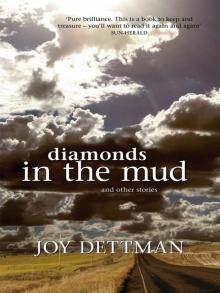 Diamonds in the Mud and Other Stories
Diamonds in the Mud and Other Stories Moth to the Flame
Moth to the Flame The Tying of Threads
The Tying of Threads Wind in the Wires
Wind in the Wires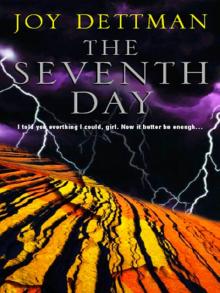 The Seventh Day
The Seventh Day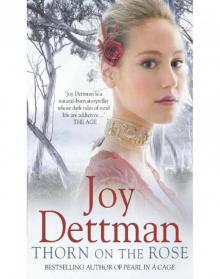 Thorn on the Rose
Thorn on the Rose Jacaranda Blue
Jacaranda Blue Mallawindy
Mallawindy Ripples on a Pond
Ripples on a Pond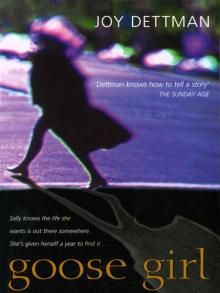 Goose Girl
Goose Girl The Silent Inheritance
The Silent Inheritance Henry’s Daughter
Henry’s Daughter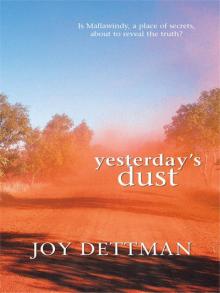 Yesterday's Dust
Yesterday's Dust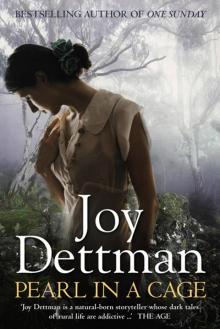 Pearl in a Cage
Pearl in a Cage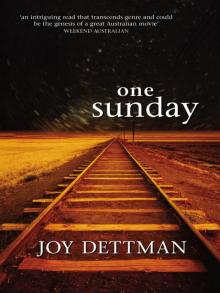 One Sunday
One Sunday